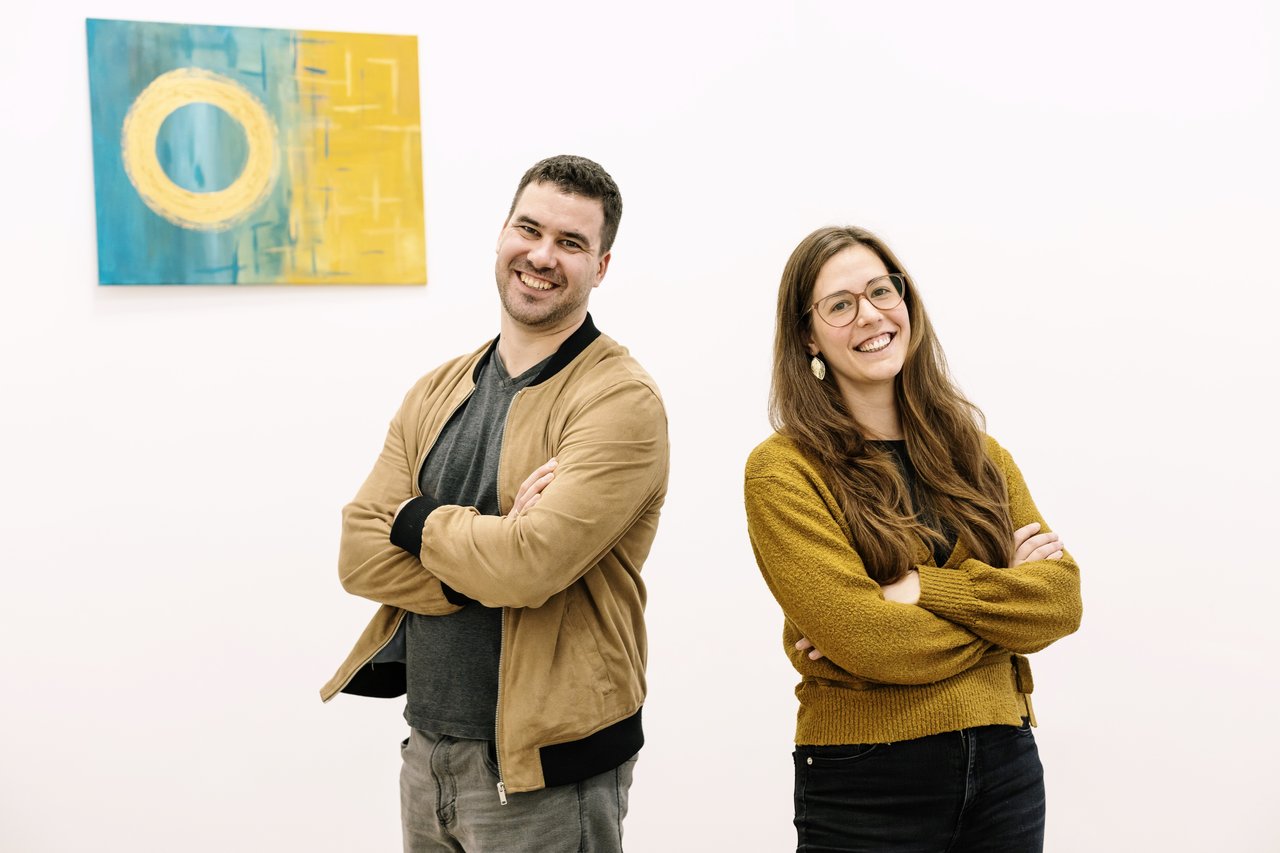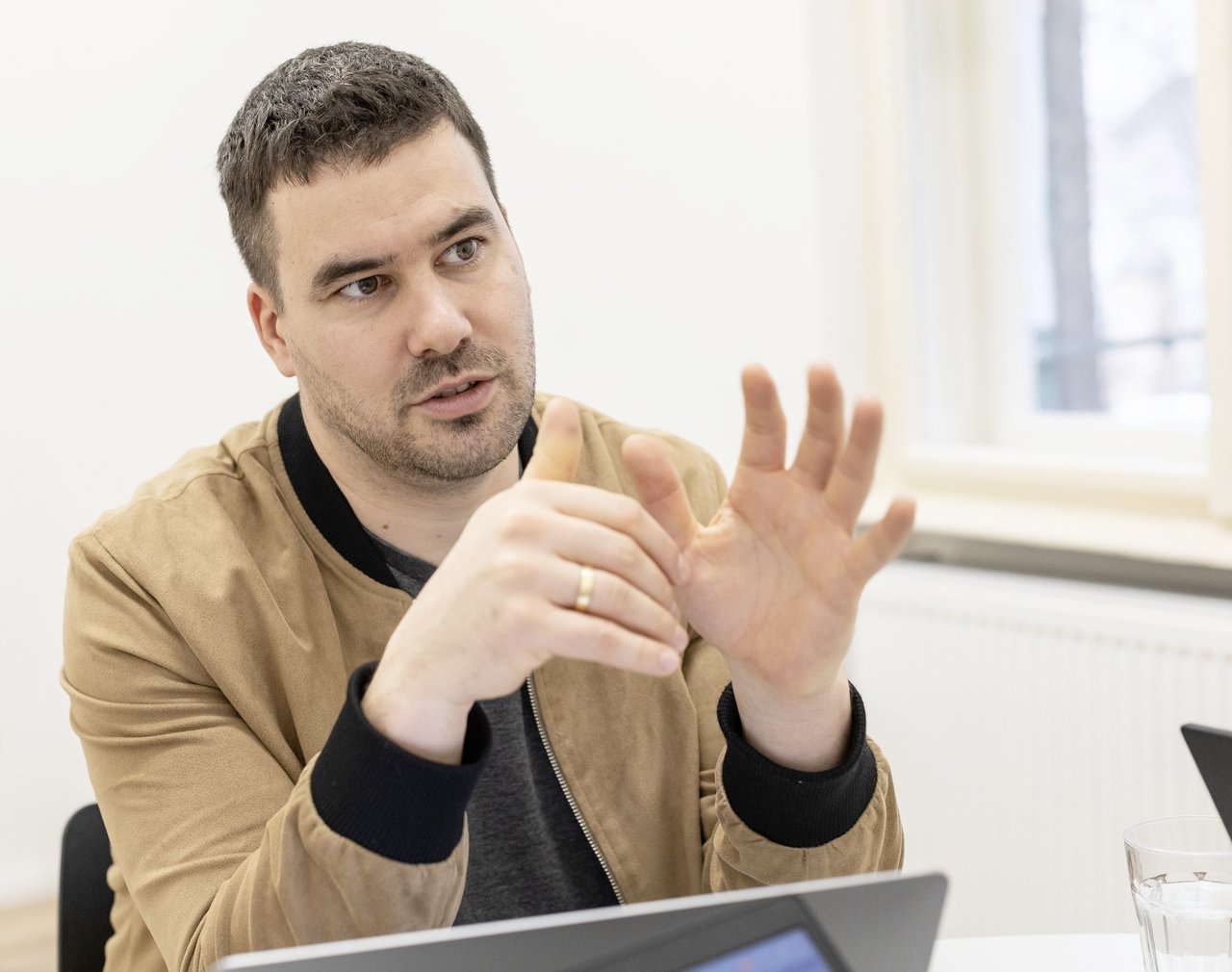2025 will be the year of youth ministry. Rev. Áron Ablonczy, head of the Youth Office and his colleague, Luca Oláh, religion teacher explained the main goals, program highlights and prioritized topics during the year.

Áron Ablonczy and Luca Oláh
What is the current situation of the Church's youth ministry?
Áron Ablonczy: According to our research, sixty-five percent of Reformed congregations have no youth work at all. The reasons for this may be complex: the burden on the shoulders of the pastors is heavy, and many young people move away for studies or work from quite a few settlements. On the other hand, we see that some four hundred and sixty congregations have some kind of youth ministry. Combined with church institutions and confirmation, there are currently approximately eighteen thousand young people whom our youth mission reaches every week. However, in Hungary there are more than one and a half million young people in this age group, so the church has ample opportunity to bring renewal to their lives.
What is the biblical leitmotif for the Year of Youth Ministry?
Oláh Luca: We chose the fifth verse of Psalm 103, and wish to praise the Lord “who satisfies your desires with good things so that your youth is renewed like the eagle’s". This verse both expresses the rebirth of the young generation and also implies that God renews us in our faith, in the first love we received from him.
Áron Ablonczy: The renewal of the church and youth work is also painful. If we are serious about mission, we need to face up to our weaknesses, for example, how we welcome young people into Sunday services. We waited passively for them to come, in vain, for decades. Now is time for us to act.
Who are at the heart of our attention this year?
Luca Oláh: One of the target audience are young people in the age between 14 and 26 years. Within this age group, we have four target groups: young teens, teenagers, those in their early twenties, preparing for their early adulthood, and young adults. In addition, we want to reach out to those who work with youth in different ways: parents, teachers, youth leaders, pastors. Many of our programmes will focus on those who do not understand young people and are concerned about future generations.
Áron Ablonczy: We think in terms of congregations, we want to involve young people in these intergenerational communities. The older people are also responsible for whether there are young people and how they are formed. Parents play a key role in this, and this is precisely why they are one of our priority target groups, because they spend the most time with young people, they have the greatest influence on their thinking and values. It is a question, for example, what to do as parents when a teenager tells us on a Sunday morning that he or she is not coming to church because they are tired, have homework, or sport competition to attend, or simply doesn't feel like it. Among other things, we'll be exploring these issues in a new video series.

„The thematic year is supported by a community of hundreds of volunteers"”
What are your objectives?
Áron Ablonczy: The aim of the thematic year is to renew the lives of young people, to bring about conversion and strengthen local churches. So the thematic year will not necessarily be about starting new events, but we want to support and focus on existing, already operating programmes, models and tools in churches in a way that will help the creation and development of other communities, missions and programmes.
Who coordinates the events?
Luca Oláh: In total, there is an enthusiastic community of two hundred and fifty members actively participating in the programme. Our organizing team was set up of representatives from six Church districts in Hungary and Romania. Balázs Farkas from the Transdanubian Church district (Pápa), Ágnes Fiser-Nagy from the Danubian district (Budapest), Gábor Püski from the Transtibiscan district (Debrecen), Györgyi Czikó from the Cistibiscan region (Miskolc), Zsolt Ádám from Oradea and Paula Farkas from the Transylvanian district (Cluj). We cooperate with the twenty-seven presbyteries in Hungary each represented by their youth coordinator. Our network includes nineteen university chaplains and mission co-workers, and one hundred and seventy-four school chaplains and school mission specialists. In addition, we work with thirty-one youth organisations with a Reformed profile, such as Refisz (Reformed Youth Association), Tirekifi (Cistibiscan reformed youth organisation), IKE (Transylvanian Christian Youth Association), the Firesz (Young Reformed Federation) in Slovakia, and interdenominational organisations such as the Youth Builders, Exodus, the KIE (Christian Youth Association) or the MEKDSZ (Hungarian Evangelical Christian Student Association).
In what ways will youth work be supported?
Áron Ablonczy: In recent years, three major studies have been conducted to explore what young people are interested in and what they expect from those who serve among them. One was a large-scale sample survey about youth and leaders serving among them. It was carried out in partnership with the Methodist, Lutheran, Reformed and Baptist churches. Smaller scale surveys were also conducted by the staff of Starpoint Reformed Youth Festival and Youth Builders. Pastors were also asked about the resources they would most welcome. It turned out that syllabuses for youth group activities were required in first place. As of next week, those who subscribe to our newsletter will receive digital lesson plans every week, and they will also be able to find more on the website of the Reformed Church in Hungary. They will help young people to work through difficult topics, dogmatic questions and biblical books that concern today's generation; the sketches will also include hymns and games. The purpose of the resources is to take some of the burden off the shoulders of pastors and youth ministers and to help them in their work of faith formation among young people.
Luca Oláh: We will also offer resources in forms of tenders to support local initiatives, such as missionary programmes, evangelisation series, Alpha Youth series, or even the organisation of camps and youth retreats. One of our goals is to develop and strengthen in young people a sense of ownership for the church. In addition to spiritual programmes and content, various products are also designed to help young people feel a sense of belonging. We produce stickers, T-shirts, sweaters, and just as the scouts recognise each other's ties and badges, we want to make Reformed young people feel that it is good to belong to the church community when they wear these clothes.
The thematic year will not only be about young people, the Church of all ages has a responsibility and a role in youth work. That is why the organisers welcome comments, questions and suggestions from our readers.
What programmes can be expected in the new thematic church year?
Luca Oláh: We have designed the concept and prepared the events for the coming year so that congregations will realize on a weekly basis: it is a thematic year. We organize awareness-raising lectures, debates, and address pastors and elders at presbytery meetings and during training courses. At several moments in the year we will focus on events related to young people, such as graduation ceremonies, school admission and school leaving events.
Áron Ablonczy: The central event of the year will be the Starpoint Youth Festival in Zánka, between 14-19 July. We are working continuously with the organizing team. There will be many opportunities for mission and faith formation activities at the festival. This year's theme is based around anxiety, as it affects today's generation on a daily basis. Forty-five per cent of young people are hopeless or depressed, and thirty-two per cent suffer from pathological anxiety, which considered a clinical condition. Fifteen per cent of young people answered positively when asked if they ever had an episode of depression. There could be many reasons for this syndrome: Generation Z is exposed to a multitude of stimuli in the family, at school and through social media, which speeds up everything. It can cause anxiety about what impressions others make on social media, whether others are better students than me, whether I'll get admission into university, what people think of me at parties, and so on. So most young people are affected, a third of them chronically. It's almost weird not to have anxiety. We will address this together at Starpoint, since we can't avoid the issue. During six weeks prior to the youth festival, we will prepare the theme with the help of the mentioned syllabuses. It will be a historic, unprecedented collaboration in youth work. In this way, the young people who follow our theme will arrive in Zanaka already prepared. During the six weeks, we will explore concepts such as addiction, family crisis, career choices, graduation, sexuality, climate change, coping mechanisms and anxiety caused self-harm. Through the thematic block, a powerful mission activity will begin in local churches as early as April, encouraging young people to come to the Starpoint and invite their friends and classmates. Our desire is that the participants of the festival will not go home in distress, but leave as messengers of hope.

„The aim of the thematic year is to promote renewal, transformation and conversion in the life of youngsters"”
Will the thematic year be present on the social media platforms most used by young people?
Luca Oláh: You have to communicate with young people on a completely different platform than with middle-aged people. Youth organisations, just like the youth department of RCH, obviously use these platforms and we will continue to be active on them.
Are these platforms suitable to communicate spiritual content?
Áron Ablonczy: In youth work we are always experimenting, and our previous experience shows that they are suitable. For example, two young people recently started an Instagram page for their podcast. This has reached many people. Different apps can also help to turn our minds inward and keep silence. The current generation uses Instagram, which we will use as primarily communication channel. We plan to launch a short video series of five to eight minutes each. It will show how people of all ages are living by their faith at school, university, at work, and we will also broadcast conversion stories.
Luca Oláh: These platforms are also good for sharing short video clips about our longer materials and contents as a teaser. This can generate interest to click and listen to our shows. We're launching a podcast, which we plan to do over several seasons. The first episodes will mainly address parents, and may also be useful for others who work with young people: pastors, religion teachers, youth leaders. The bi-weekly videos will focus on topics that strongly affect young people: addiction, generational differences, family patterns, career choices, love, parent-child relationships, self-awareness and anxiety.
Podcast is a popular online content format, and the internet is full of chat shows. How will your podcast be different from others?
Luca Oláh: There are a lot of shows about how people react to certain mental processes, and we can learn a lot of useful psychological analysis in this way. However, there is seldom that theological approach is involved in these explanations. There is little in them about how God is present in these situations, how he can help us. I think a great strength of our video programme will be to explore these issues from a professional and theological perspective at the same time.
Áron Ablonczy: I think that it is the central message entrusted to the church which will make the difference. Would we produce just the same content as the others, we would get lost in the crowd, because there is always someone who does it better. The novelty of our approach is the clear dedication and outspoken conviction that the Gospel is relevant also in the life of youngsters. We use the Bible to approach questions and situations such as divorcing parents, breaking up with a partner, addressing climate change, or the reality of Christion in anxiety. This might reduce the ‘clicks’ and the audience, but we want to reach Christians who have been missing out on exactly this kind of content. The thematic year can be a blessing if we call on God in every area of our life. He alone is the one who can be perfectly present in every situation, who only can renew our personal faith and revitalize our Church.
Originally published in the Reformátusok Lapja, the weekly magazine of RCH